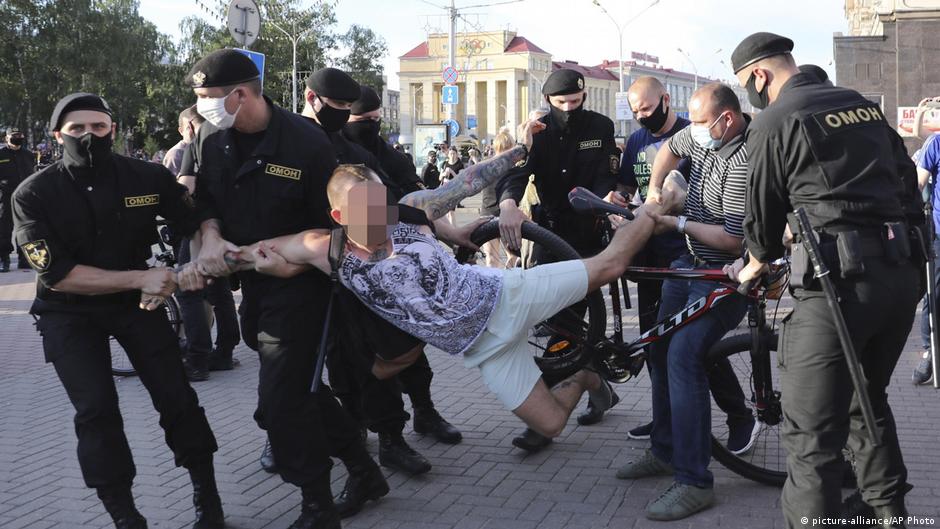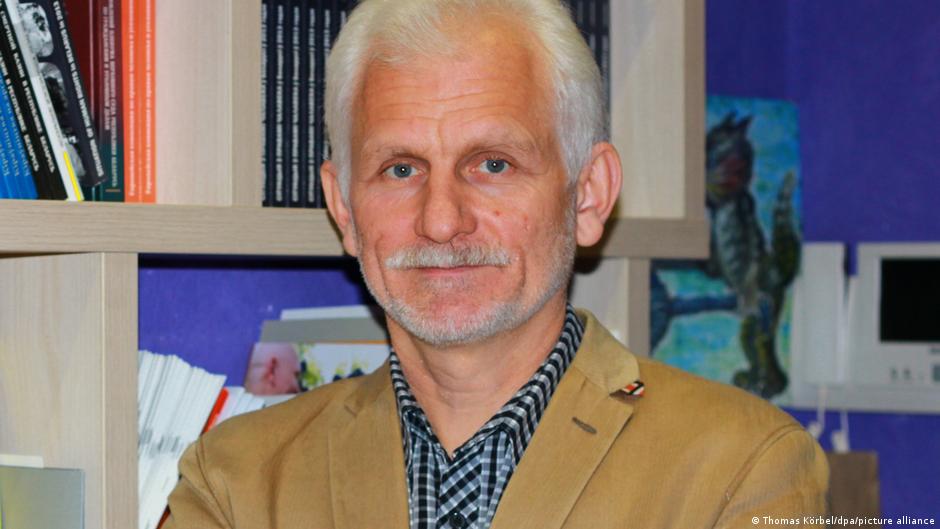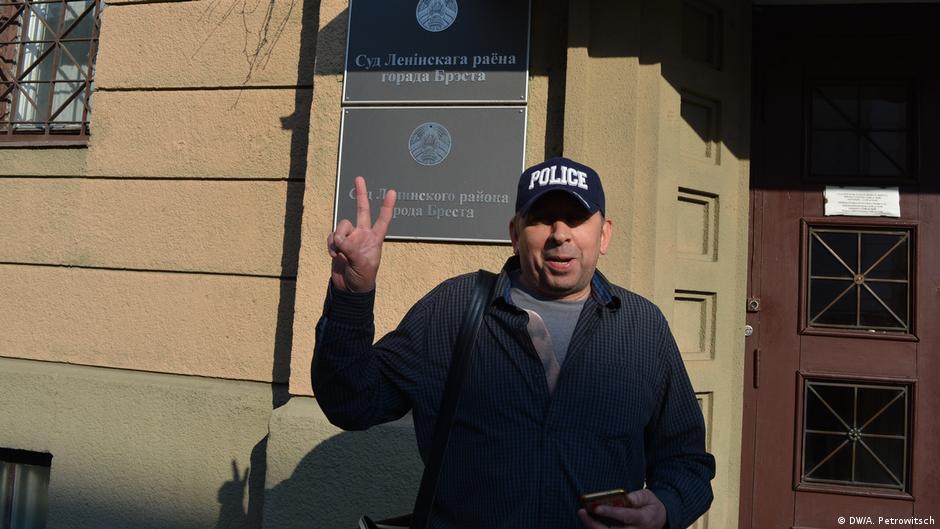21 March 2021 | Deutsche Welle

Source: Deutsche Welle
Ales Bialiatski, the head of Viasna Human Rights Centre in Minsk, told DW that the level of repressions in Belarus is off the charts and explained how the West can help Belarusian political prisoners.
The head of Viasna Human Rights Centre, Ales Bialiatski, commenting on the situation of criminal prosecution of protesters in Belarus, said in an interview with DW that the level of repressions in Belarus is off the charts. The repressions have affected Viasna office as well. Bialiatski, a former political prisoner himself, having spent almost three years first in a pre-trial detention center and then in a penal colony, explained to DW how the administration of the detention facilities puts pressure on political prisoners, and how the prisoners can defend their rights.
DW: The Prosecutor General’s Office of Belarus forwarded 468 criminal cases against the protesters to court. This number is astounding. What is going on?
Ales Bialiatski: As a matter of fact, no one has the accurate count of these cases. I believe there are many more of them because about 2,500 criminal cases have been initiated. Some of them have not been completed yet. Some cases involve 10 – 12 people at once, others have only one person being charged.
Four of our employees are currently in а pre-trial detention centre. The criminal case against Viasna is evolving. My colleagues have now been summoned for an interrogation by the Investigative Committee. We are being accused of financing activities that grossly violate public order. We are being prosecuted for helping people write complaints and advising them on how to behave during peaceful protests.
Under this article of the Criminal Code, the punishment is up to two years in a penal colony. In addition to that, some other articles may be brought up. It happens quite often that they start with just one, then а second and а third articles follow. I myself am a witness in two criminal cases so far, but my status can change at any time.

Source: Deutsche Welle
In general, we had about a hundred trials a month in both January and February [for cases of protesters. – Ed.]. All this suggests that the scale of repressions in the country is unprecedentedly high, something that has not happened since Stalin times. We can’t compare it with anything. Going back to the history of Belarus during the Soviet era, we had about one to three people prosecuted annually under anti-Soviet articles in the 60–80s. Right now we have hundreds of people being sent behind bars every month, hundreds serving their sentences, and new criminal cases being initiated literally every day. The level of repressions is simply off the charts.
The authorities speak to the people in the language of violence. The so-called judiciary system is not independent, it is being used against political opponents who represent the most diverse groups of society: students, journalists, political activists, members of the election campaign teams of presidential candidates, ordinary workers. In the summer and fall of 2020, all of them peacefully protested against violations and fraud during the August 2020 election. Right now, we are seeing an enormous wave of trials and repressive actions from the government authorities.
It is not surprising that the number of political prisoners in Belarus is constantly growing. What conditions are they being kept in behind bars? Are those conditions different for ordinary criminals convicted under non-political articles?
According to Belarusian human rights activists, as of 15 March 2021, 281 people were recognized as political prisoners in Belarus. And yes, this number is constantly growing. Sometimes we are even being accused of not recognizing people as political prisoners quickly enough. We have rather strict standards.
Living conditions in Belarusian prisons do not meet international standards. This applies to the number of inmates sharing a cell, the cells themselves that look more like public bathrooms, food, medical care, and, of course, solitary confinement. This is a pretty serious test for any person. I myself stayed in two pre-trial detention centres and in one penal colony. I can say with confidence that one needs to have very good health to survive a Belarusian prison, and even good health can be compromised very easily there.
There is not enough light in the cells – the “eyelashes” [bars] on the windows barely let any light through so your eyesight deteriorates very quickly. The food given to prisoners has very low nutritional value. If you do not receive packages with vegetables and supplements from the outside, you can lose your teeth very easily.
The political prisoners, of course, receive a special treatment from the prison administration. Many political prisoners end up in solitary confinement if they begin to assert their rights in any way: to an outside walk, to receive mail that disappears into no-one-knows-where as most letters to prisoners never reach their recipients.
There was such an incident a week ago in a pre-trial detention centre in Mahiliou, where a blogger Siarhei Piatrukhin is being held…
… he is the one I wanted to ask you about. Piatrukhin slit his wrists open protesting against the conditions of detention. How effective are such radical actions? Do they help improve the situation?
A prisoner, like any other person, always has a choice. When you see that your rights are grossly violated by the administration, this choice can be rough. Piatrukhin, who is on trial and needs maximum concentration [of attention], was put in a cell with a mentally ill person and a pedophile. He started to demand to be moved to a different cell. But it was not accidental that he was placed in that cell. It is obvious that the administration is placing him under psychological pressure at the request of, most likely, the intelligence agency. Because during the trial, Piatrukhin behaves boldly, challenges the entire judicial system, denounces the regime by acting as a tribune. They try to pressure him through the conditions of detention, and he protests by slitting his wrists open.

Source: Deutsche Welle
A prisoner always has this trump card – self-harm or a hunger strike. This is probably the last card that can be put on the table. This is always very serious, as we can see now with Piatrukhin or with Ihar Bantsar in Hrodna, who held a dry hunger strike at the limit of his physical capabilities. Of course, these are the extreme measures. How effective they are and how willing a person is to try them is always a matter of their personal choice.
During the three years that I spent in the colony, I never went on a hunger strike or injured myself. But I always knew that if such a critical moment comes, when I am pushed against a wall, there is always an opportunity to show my protest. Now we see that hunger strikes in Belarusian prisons are pretty common. This tells us that psychological or even physical pressure on political prisoners takes place.
In penal colonies, the situation is even worse. The administration is in full control. They often create a so-called “strong asset” from the inmates willing to cooperate with them. Such inmates are ready to do anything. They can start a fight, provoke others to certain actions if they received an assignment from the head of the colony or the head of the detachment unit – each of them usually has their own network of such “activists”. Therefore, a prisoner has to fight off both the administration, pressuring them with the restraints on visits and parcels from the outside, as well as these “activists”.
A lot will depend on a person – how they behave, how ready they are to rebuff this pressure, and how psychologically strong they are to withstand this pressure over a longer period. Because you are in a colony not for just a day or a month. Rights now, of course, the situation is different compared to when I was in the colony in Babruisk seven years ago. Back then, I was the only political prisoner there. Right now there are hundreds of them. This is a very serious challenge for the administration, because it will be difficult to deal with them [political prisoners], to force them to be calm and obedient.
How does the administration respond to such radical actions of prisoners as slitting wrists or going on hunger strikes?
They are a part of the old Soviet school, all methods of punishment have remained the same. If you read the memoirs of Soviet dissidents, you will immediately see that the Belarusian colonies and prisons are indistinguishable from the Soviet ones. Naturally, for any of those actions, a prisoner is sent to solitary confinement (if held in a pre-trial detention center) or punitive confinement (if held in a colony). After several violations in the colony, they become malicious violators of the order and are restricted in parcels and visits from the outside.
After a certain number of violations, the court can send the inmate to prison, where the regime is even stricter. You need to have even better health to survive the prison. Mikalai Statkevich, for example, went through the entire route – the pre-trial detention center, then the colony, then the prison. Fate had mercy on me, I was released after the colony. But I always knew that in any moment I could have been sent that route too as a malicious violator. It is quite easy to become one – your button is not done properly, your book is inside the nightstand, and so on. The administration will always find a reason to issue a penalty.
How can the West and the European Union, as its part, help Belarusian political prisoners?
It is necessary to constantly increase the pressure on the Belarusian authorities. The political system in Belarus is in deep crisis, we have not overcome it. It flared up in August 2020 and still keeps going, just in a different form. The economic situation had already been not very good, and now the country is on the verge of a real decline.
No one should follow the lead of the Belarusian authorities and support this regime financially in any way. In fact, the current situation with human rights in Belarus is the same as that in Turkmenistan or in North Korea. And let me reiterate that only political and economic pressure from the West can influence Minsk.